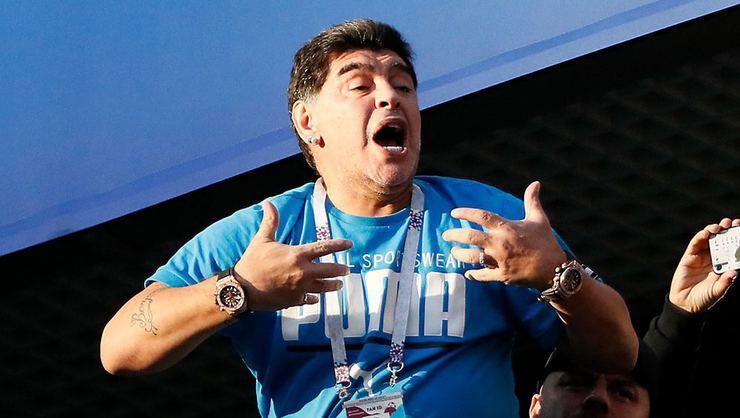
MAÇ SONUNDA HASTANELİK OLDU<br><br> Efsane futbolcu maç sonunda ise fenalaştı. Maradona yanındakilerin yardımıyla locadaki koltuğa uzandı.
Diego Maradona greeted a new film about his life with scorn on May 20, telling people not to see it when it is released next month.
Posters for the two-hour documentary about the controversial Argentine forward say 'Diego Maradona: Rebel. Hero. Hustler. God.' with the World Cup winner upset at the use of "hustler."
"I played football and I made money running after a ball. I didn't hustle anyone," he told Univision in an interview.
"If they are putting that there to get people to go and see it then I think they are going about it the wrong way. I don't like the title, and if I don't like the title I am not going to like the film. Don't go and see it."
Maradona, who is now coaching in Mexico, missed the film's premier at Cannes on May 19.
Director Asif Kapadia, who made the award-winning documentaries "Amy" and "Senna," had earlier said Maradona had not seen the film and admitted he was interested how the player would react to viewing the finished article.
"We are dealing with archive from way back, there will be lots of images that he himself hasn't seen of himself, of his family, of his kids," Kapadia said. "So I think it's going to be quite emotional for him."
Intimate moments
The documentary shines a light on intimate moments with his family and teammates through previously unseen footage that capture the giddy highs and also the lows of his rollercoaster career.
Maradona, who has been frequently hospitalized over the years, often on account of the extravagant lifestyle and years of drug addiction he is also known for, works today as a coach for Mexican second division club Dorados.
"Sadly he's injured, he's not well and he's been carrying this injury all the way through because he's been coaching," Kapadia said.
The film, which drew a warm response from critics after its screening during the Cannes Film Festival, homes in on some of the most intense moments of Maradona's rise to superstardom, when he played for Italy's Napoli in the 1980s and won the World Cup in 1986 with his home team, Argentina.
The headiness of the period is captured in evocative scenes around Naples, where fans took their Maradona-worship to the next level. But it's the snapshots from the team's changing room and close-ups of the player at parties or goofing around with his young children that add to the gripping, behind-the-scenes feel of the film, which tries to separate "Diego" the man from "Maradona" the legend.
Kapadia said one of Maradona's agents had hired two camera people to follow him around during his years in Italy, yielding material that had in the end never seen the light of day. He also dug into private footage.
Maradona the cocaine user and Maradona the womanizer are also never far away in the film.
"It really moved me because it also reflects on the dark side of Maradona," said Daniel Arcucci, a sports writer who is also the soccer player's official biographer, and who appears in the film.
"It's a tough film but at the same time very loving towards Maradona."
The film is due for general release on June 14.